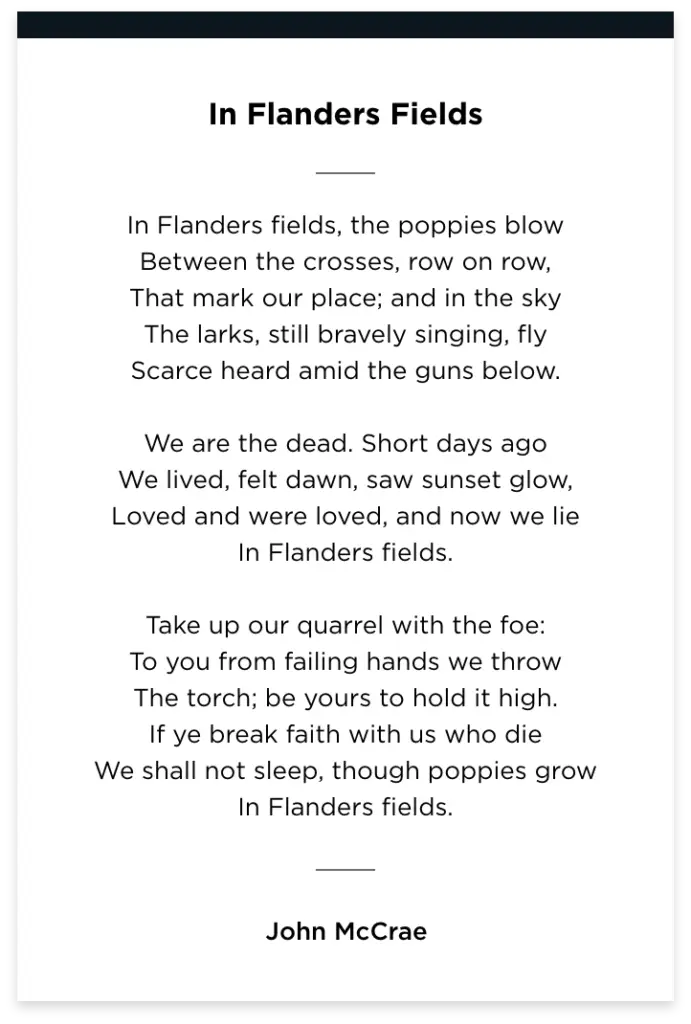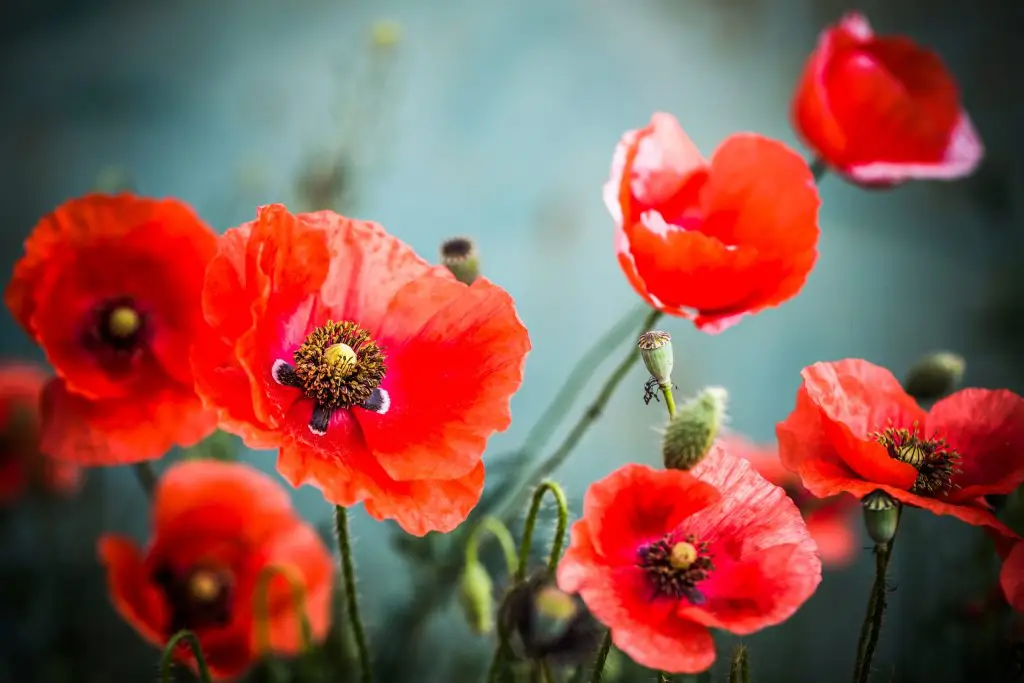In the spring of 1915, following the Second Battle of Ypres, Canadian Lieutenant Colonel John McCrae was tending to the wounded and noticed a brilliant red patch of poppies blooming in the freshly broken soil of the battlefield. Amidst the carnage of a battle that claimed over 120,000 lives and left thousands maimed from artillery and gas attacks, he was struck by the resilient little weed’s ability to defy the destruction and persist with its bright red bloom. A defiant symbol of life. He was so moved he penned “In Flanders Fields.” Published later that year in Punch, a British weekly, his thoughts found their way into the homes of allied families across the Commonwealth and into American homes later in the war. While he never returned from France, John McCrae’s poem and the poppy became a near-universal symbol of remembrance for those lost in The Great War.
Celebrated since the end of the Civil War as Decoration Day, Memorial Day evolved into the modern federal holiday in 1968. Each year we honor those who gave the last full measure of devotion for their country and their comrades in arms. Its significance differs from individual to individual. I had the privilege of spending a decade serving as an active-duty Soldier during the Global War on Terror. My grandfathers served in World War II, Korea, and Vietnam. In my view, whether you sit on the right or the left, whether you and yours have been citizens for generations or are recent additions to the American family, Memorial Day is a chance for us all to remember a long, unbroken line of sacrifice to a novel ideal. An imperfect union and an ever-evolving experiment in self-government and human collaboration.

Throughout the year, I frequently remember specific brothers and sisters in arms. Young lives that touched my own and were cut short in places like Afghanistan, Iraq, and West Africa. I grieve their loss in different ways, and many Americans have their own list of names, photos, bracelets, and Gold Stars to remember others like them. The longest chapter in my war is slowly drawing to a quiet close in Afghanistan, and Memorial Day is approaching. Under the circumstances, I wish I had one last chance to speak with my fallen friends and ask them two questions: Why you and not me, and was it worth it?
I am left to search for those answers without their help, but Lieutenant Colonel McCrae’s poem gives them a voice today as it did over a century ago: “To you from failing hands we throw the torch; be yours to hold it high.” I’ve come to believe that we best remember those who have fallen and we earn their sacrifice through our contributions. I chose to leave active-duty service and find a new way to contribute, and it has, at times, been a tough transition. Having spent four of those six years working at NT Concepts, I have met some of the brightest technologists, engineers, leaders, and thinkers from this generation and the next, and it has opened my eyes to the different ways we each carry the torch. In this new century, the future belongs to those who can master technology and put it to positive effect. At my company, and among the broader industry, we work with people who bring real contributions to national security and intelligence problems. Many of these contributions will never be widely known. Their energy and their drive to contribute and serve are infectious and comforting to me.
Memorial Day is a day of celebration. Enjoy the renewed weather, the sounds and smells of early summer, and take the time to appreciate close friends and loved ones. I would ask, however, that you take a moment to reflect on how we have carried and will continue to carry the torch. We all wear multiple hats: parent, sibling, child, trusted friend, and professional. We are also all citizens. Regardless of political beliefs, economic means, education, or origin, we all share a collective debt to a group of men and women who freely traded their individual futures for ours. I firmly believe that if we could have that one last conversation with the fallen, they would want us to celebrate their sacrifice by living as much life as we can pack into the years they never got to see.
Service to—and celebration of—community is a core tenet of the culture here at NT Concepts. There is ongoing support needed for the families who have lost military service members. This year, our #NTC_GivesBack community is joining the Armed Forces Cycling Classic Challenge Ride to support military families who have lost an active-duty service member. Our employees, family, friends, and business colleagues will gather in Crystal City, VA, on June 5 to cycle past Arlington National Cemetery and the Pentagon to raise money for the Tragedy Assistance Program for Survivors (TAPS). TAPS provides comfort, care, and resources to all those grieving the death of a military loved one through a national peer support network and connection to grief resources, all at no cost to surviving families and loved ones. For more information on the good work of TAPS, visit their website at www.taps.org. You can support fund-raising efforts for this event by visiting our #NTC_GivesBack team site.
